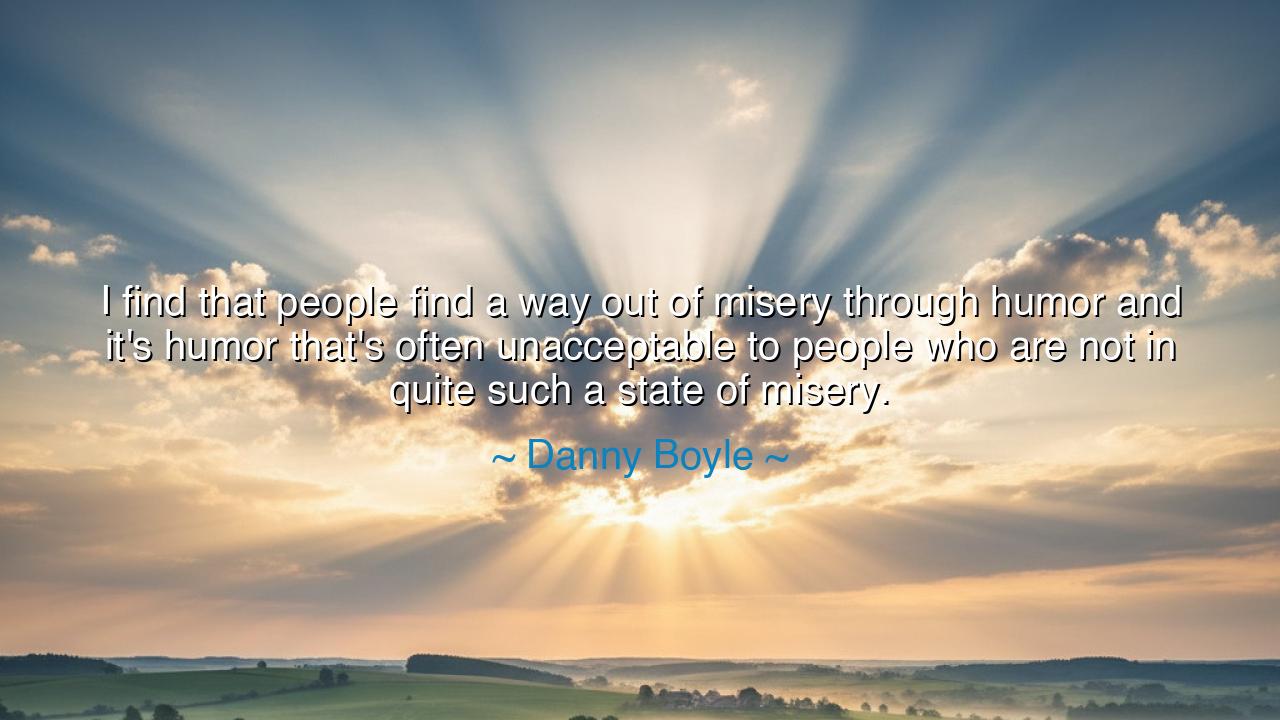
I find that people find a way out of misery through humor and
I find that people find a way out of misery through humor and it's humor that's often unacceptable to people who are not in quite such a state of misery.






In the words of Danny Boyle, “I find that people find a way out of misery through humor and it’s humor that’s often unacceptable to people who are not in quite such a state of misery.”
Here speaks the voice of an artist who has seen both the heights of triumph and the depths of human struggle. Beneath this statement lies a truth as ancient as suffering itself — that humor is not a denial of pain, but a rebellion against it. Boyle, whose films often walk the thin line between tragedy and laughter, understands that those who have suffered deeply often learn to laugh differently, for their laughter is not born from comfort, but from courage. To laugh while broken is to defy despair; it is to whisper to the darkness, “You will not have me.”
When Boyle says that this kind of humor is unacceptable to those not in misery, he reveals the sacred paradox of the wounded spirit: that laughter, when born from pain, is misunderstood by those who have not known it. To the comfortable, such humor may seem harsh or inappropriate; but to the suffering, it is salvation. It is the language of survival, the only way to make sense of what cannot be explained. The ancients called this kind of laughter the laughter of the gods — laughter that rises from the ashes of destruction, not to mock tragedy, but to transcend it. For in that laughter, the soul asserts its immortality.
The origin of this truth can be traced through the long river of human history. In the trenches of war, soldiers have laughed amid ruin; in the prisons of tyranny, captives have shared jokes whispered like prayers. The Roman philosopher Seneca, exiled and betrayed, wrote that the wise man laughs not because life is easy, but because he refuses to be enslaved by its cruelty. In the medieval age, jesters stood beside kings not only to amuse them, but to remind them — through laughter — of their own mortality. And in our own time, survivors of disaster and oppression have often turned to dark humor as their armor. For when all else is stripped away, humor becomes the final act of resistance, the soul’s declaration that it cannot be crushed.
Consider the story of Viktor Frankl, the Jewish psychiatrist who survived the Nazi concentration camps and later wrote Man’s Search for Meaning. In that abyss of horror, where death and despair reigned, Frankl and his fellow prisoners found moments of laughter — fleeting, bitter, yet strangely luminous. He recalled that “humor was another of the soul’s weapons in the fight for self-preservation.” A well-timed joke among the starving was not cruelty; it was courage. It was a way of reclaiming their humanity from the machinery of inhumanity. This is what Boyle means — that humor born from misery has a power and depth that the untested heart cannot fully understand.
The dark humor of the suffering is, in truth, the light of their endurance. It may appear crude, even offensive, to those who dwell in comfort, for it reveals what comfort allows them to ignore: that the world is filled with pain, and yet the human spirit persists. This laughter is raw, unfiltered — the sound of a heart still beating after being broken. It does not seek approval, nor does it hide its scars. To those who have known sorrow, such laughter is not blasphemy but prayer — the prayer of the defiant, who refuse to bow before fate.
Boyle’s insight reminds us that humor is not always polite or pretty. It can be wild, untamed, and uncomfortable — as life itself often is. Yet therein lies its holiness. To laugh while others weep is cruelty, but to laugh while you yourself are weeping is redemption. This laughter carries wisdom that only the broken can know — the wisdom that even in ruin, beauty survives. It is the sound of the human soul remembering that it is still alive.
Let this, then, be the teaching: never dismiss the laughter of the suffering. When you hear humor that shocks or unsettles, listen deeper — for beneath it may lie a cry of survival, a spark of faith, a testament to endurance. Learn from those who can laugh through pain, for they are the keepers of resilience. And if you, too, walk through sorrow, do not silence your laughter. Let it rise, even when the world cannot understand it. For laughter born of love and loss is the most sacred kind — the laughter that heals.
And so, dear listener, remember Danny Boyle’s wisdom: “People find a way out of misery through humor.” Embrace that truth. When life wounds you, laugh not to deny your pain, but to rise above it. Let your laughter be a song of defiance, a hymn of hope. For in that laughter — even if the world cannot accept it — lies the proof that your spirit still burns, undiminished and free.






AAdministratorAdministrator
Welcome, honored guests. Please leave a comment, we will respond soon